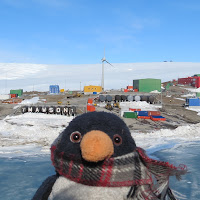Mawson.
Named after Australia's most celebrated Antarctic explorer, Mawson is the most westerly of Australia's stations. It is also widely acclaimed by those familiar with our stations as the most picturesque.
What do I reckon about that?
I reckon you should read on, and my opinion will be apparent! Apparently.
So this was the day we arrived at Mawson - after less that two days' sailing from Davis. It's practically next door!
The first indication we had that we were close (aside from the charts and satellite images etc etc., but let's not quibble) were the two massive wind turbines poking up above the island below...
.jpg) |
| Wind generators? That must be why it was so windy. |
So the station makes full use of them. Under normal conditions these winds enable Mawson to generate 70% of its electricity requirement. Which is an excellent result.
Regularity is not the only hallmark of the katabatic winds. In addition to being reliable they are also bloody cold, having been generated by the largest ice block this side of Jupiter. Bloody. Cold.
Take note of the following photo. This person is not only fully kitted up in their survival gear, but they are also sheltering around the corner of the heli hangar. Bloody. Cold.
.jpg) |
| Cold? Bloody cold! |
.jpg) |
| Mawson! Or a station that looks very very similar. But I think it's Mawson. |
And there it is, butted up against the base of the Antarctic Plateau, with Mt Henderson poking majestically (yes, majestically!) up through the ice. Stunning!
Of course, I didn't brave the nostril-searing cold winds. I went up the the bridge to watch our approach. I'm not an idiot, you know.
I'm not. Shut up.
The station is located in a small but deep bay called Horseshoe Harbour. To give you an idea of the area here is a satellite image. (Or would you believe... I put my camera on the tip of a really long pole and took this photo?)
(Don't forget - if you click on the picture above you'll get a look at a full sized version of the image. And thanks to the AAD for the use of it).
Mind you, since we approached from the north, perhaps it would make more sense to you if I oriented the image this way.
Aaaanyway... the sea ice from last winter had still not broken up and blown out. Despite being further north than Davis is, Mawson's proximity to the Plateau means that it is noticeably colder (did I mention the cold?) and the sea ice can tend to hang around longer.
Especially so in Horseshoe Harbour since it is quite sheltered.
In order for resupply to take place we need that ice gone. So the ship slowly moved its way into the bay.
.jpg) |
| The station. The ice. The ice breaker. Whatever will happen next? |
The intention was that the ship's bulk, in combination with the wash from the propellor, will break the ice up. Then the next morning's katabatic winds should carry the smallenised sheets of ice away, leaving behind a clear bay ready for resupply operations.
In theory.
Watching the commotion from its front row seat on the shoreline was, believe it or not, a Weddell seal(!).
.jpg) |
| An exclamation mark! |
Also available for a closer view was one of the two wind turbines. Impressive, believe me. Photographs do not do these things justice.
.jpg) |
| What the Netherlands would look like if they were in Antarctica. |
.jpg) |
| An ice hole. |
This in/out movement was repeated slowly as the Captain was trying to achieve the desired result.
The ship's angle was fine-tuned with the assistance of the workboat, the (imaginatively named) Aurora II.
.jpg) |
| Invaluable assistance, I am sure. |
Which the wash from the propellor soon enhanced.
.jpg) |
| The ice. Not all it's cracked up to be. |
And because sound and movement make things so much better, here is a movie of those cracks being widened.
But that was only the start. The bulk of the ice clearing would have to be done by the katabatic winds the following morning. So the Aurora upped stakes and we headed back out to sea to wait and see what the morning would bring.
Would those cracks be enough for the wind to sink its teeth into? Were we wasting our time? Would we be able to get the resupply under way, and I would I be able to get ashore at Mawson?
Tune in next time for the next exciting instalment of Jeff of the South to find out!
PS. And yes, I reckon Mawson is a stunner. Easily the jewel in the crown of Australia's stations. Easily.

+-+Copy.jpg)
.jpg)
.jpg)
No comments:
Post a Comment